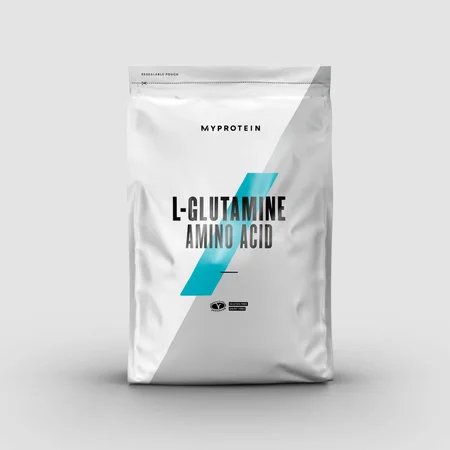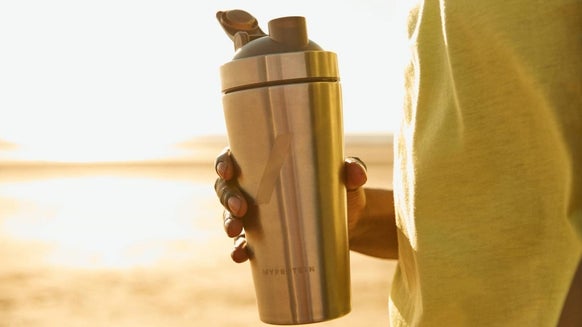How Does Glutamine Help With Bodybuilding?

In the supplement industry, there are limitless products and ingredients out there claiming to increase muscle mass, burn fat, increase testosterone and more.
As much as we would all like to believe these claims at face value, it's important to remember that some companies can make crazy claims without any scientific backing and it will go unchecked, remaining on the label. Without making overblown claims though, some ingredients that receive unrelated media hype might be able to be sold without any claims on the label, but will still sell extremely well due to this hype.
Lastly, some supplements might just have contradicting studies, which is when some companies might highlight the positive studies and push back the negatives/inconclusive studies. One supplement that has been subject to all of these, is glutamine. More than likely you’ve heard of it as a standalone supplement or added to various protein powders claiming to increase muscle mass and/or speed up recovery. Is this a supplement that has been falsely claimed to benefit us/has only highlighted the benefits while ignoring the negatives, or is it a legitimate supplement that we should be using?
Read on to find out if glutamine can benefit bodybuilders and other athletes!

What Is Glutamine?
First it is important to understand what glutamine is before we can discuss its potential benefits or lack of. Found in foods such as meats, eggs and whey/casein protein among others, it is the most abundant amino acid in the body. Known as a conditionally essential amino acid, it is right in the middle between a non-essential (your body doesn’t need it to function or survive), and essential (needed to function and survive). What this means is that for healthy individuals, supplemental glutamine is not needed to stay healthy, but it’s during periods of disease/trauma that it becomes essential to survival.
The Benefits Of Glutamine
As a bodybuilding aid for muscle gain or recovery though, the lines get a bit more blurry. In vitro (otherwise known as isolated cells in glass tubes) studies, glutamine has been shown to increase muscle anabolism (muscle growth) when consumed in excess and catabolism (muscle loss) when not consumed to create a deficit. The problem with in-vitro is that because these cells are separate from the rest of the body, many mechanisms are not able to happen, making the results not always the same between test tubes and actual people. This difference is proven in other human studies that have shown a failure to induce muscle protein synthesis when dosed the exact same (scaling up of course) as the vitro studies.
In other small studies (also in vitro), it has been reported that glutamine lessens the rate of leucine oxidation, simply meaning it allows more leucine to go towards muscle growth. This might explain the results of other studies that have come before it. So while glutamine's ability to stimulate muscle growth is possible but hasn’t been proven in human subjects, other benefits do exist that are worth talking about.
Those participating in hours of endurance exercise without a chance to refuel may be able to achieve more benefits from glutamine in the form of faster recovery or less muscle catabolism (dosed at anywhere between 5-15 grams). Not because more glutamine will provide additional benefits, but because hours of physical activity might actually lower glutamine levels in the body below optimal, causing slower recovery or muscle loss. This means any recovery or muscle loss prevention will come from returning glutamine stores in the body to their normal levels. This might help us understand why glutamine is less likely to benefit bodybuilding or intense but short training as it will not deplete glutamine stores enough to negatively affect recovery or muscle loss.
Others that might suffer from lower glutamine levels that potentially could benefit the same way as long-distance endurance athletes include individuals who eat a very low amount of protein in their diet, as well as vegans. Beyond exercise-related benefits though, glutamine has proven benefits in the realm of immune health and intestinal health. Without getting too scientific (which has already happened a bit too much in this article already), glutamine is required to produce a protein needed by white blood cells. This protein known as cytokines, and when increased in the body will actually help you fight off bacterial disease and possibly even help with healing wounds. As for your intestines, the small intestine in particular requires more glutamine than any other part of your body.
Simply put, glutamine helps maintain the integrity of the intestinal walls, lowering its permeability (sometimes called a leaky gut). This benefit might be able to help individuals who suffer from IBS, Crohn’s disease, and even lessen the intestinal side effects of chemotherapy.

Take Home Message
So what does this all mean? Well unfortunately for those of us hoping to use it for increased recovery from weight lifting or increasing muscle protein synthesis, the studies are mixed. In vitro studies have shown slight benefits, but when converted to actual human subjects these benefits seem to disappear.
For those who are deficient in glutamine, such as vegans, individuals eating a very low protein diet or after a very long endurance workout, supplemental glutamine can help restore glutamine stores in their body to baseline. This will provide them with an anti-catabolism effect of their muscle mass and increased recovery, but only back to the level of healthy individuals. Besides fitness-related benefits though, glutamine has been proven to increase our immune systems effectiveness as well as helping to prevent damage/improve intestinal health.
If you have the money and want to take the chance of possibly helping your recovery/the muscle sparing effects, or want to take glutamine for the other beneficial reasons, there is no reason not to. It is naturally found in your body and has no negative side effects up to around 50 grams (way more than you would ever need to take). Who knows, we may find out eventually that it actually does benefit healthy individuals who lift weights once bigger studies have been conducted, but until then, it is important to remain sceptical about any claims made about glutamine in regards to its bodybuilding benefits.

Alice Pearson is a UKVRN Registered Associate Nutritionist and UK Anti‐Doping accredited advisor, having obtained a Bachelor’s of Science in Nutrition and a Master’s of Science in Sport Nutrition. She has a specialist interest in the use of sports supplements for improving health, fitness, and sport performance. Alice has experience working with both amateur and elite athletes, including providing nutritional support to Tranmere Rovers FC and Newcastle Falcons Rugby Club. Her nutritional guidance is always supported by evidence‐based research, which she keeps up to date through continuing professional development and independent learning. In her spare time, Alice loves travelling, hitting the gym, and getting stuck into a good book. Find out more about Alice's story here.








